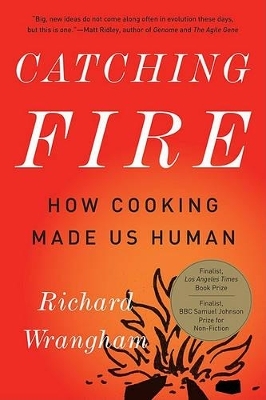
Catching Fire
How Cooking Made Us Human
Seiten
2010
Basic Books (Verlag)
978-0-465-02041-6 (ISBN)
Basic Books (Verlag)
978-0-465-02041-6 (ISBN)
A startling new theory that the invention of cooking led to the creation of the human species
Ever since Darwin and The Descent of Man , the existence of humans has been attributed to our intelligence and adaptability. But in Catching Fire , renowned primatologist Richard Wrangham presents a startling alternative: our evolutionary success is the result of cooking. In a ground-breaking theory of our origins, Wrangham shows that the shift from raw to cooked foods was the key factor in human evolution. When our ancestors adapted to using fire, humanity began. Once our hominid ancestors began cooking their food, the human digestive tract shrank and the brain grew. Time once spent chewing tough raw food could be sued instead to hunt and to tend camp. Cooking became the basis for pair bonding and marriage, created the household, and even led to a sexual division of labour. Tracing the contemporary implications of our ancestors' diets, Catching Fire sheds new light on how we came to be the social, intelligent, and sexual species we are today. A pathbreaking new theory of human evolution, Catching Fire will provoke controversy and fascinate anyone interested in our ancient origins- or in our modern eating habits.
Ever since Darwin and The Descent of Man , the existence of humans has been attributed to our intelligence and adaptability. But in Catching Fire , renowned primatologist Richard Wrangham presents a startling alternative: our evolutionary success is the result of cooking. In a ground-breaking theory of our origins, Wrangham shows that the shift from raw to cooked foods was the key factor in human evolution. When our ancestors adapted to using fire, humanity began. Once our hominid ancestors began cooking their food, the human digestive tract shrank and the brain grew. Time once spent chewing tough raw food could be sued instead to hunt and to tend camp. Cooking became the basis for pair bonding and marriage, created the household, and even led to a sexual division of labour. Tracing the contemporary implications of our ancestors' diets, Catching Fire sheds new light on how we came to be the social, intelligent, and sexual species we are today. A pathbreaking new theory of human evolution, Catching Fire will provoke controversy and fascinate anyone interested in our ancient origins- or in our modern eating habits.
Richard Wrangham is the Ruth Moore Professor of Biological Anthropology at Harvard University and Curator of Primate behavioural Biology at the Peabody Museum. He is the co-author of Demonic Males and co-editor of Chimpanzee Cultures. He lives in Cambridge, Massachusetts.
| Erscheint lt. Verlag | 7.9.2010 |
|---|---|
| Sprache | englisch |
| Maße | 140 x 210 mm |
| Themenwelt | Sachbuch/Ratgeber ► Essen / Trinken |
| Sachbuch/Ratgeber ► Natur / Technik | |
| Naturwissenschaften ► Biologie ► Evolution | |
| Naturwissenschaften ► Biologie ► Humanbiologie | |
| Naturwissenschaften ► Geowissenschaften ► Mineralogie / Paläontologie | |
| Sozialwissenschaften ► Ethnologie | |
| Sozialwissenschaften ► Soziologie | |
| ISBN-10 | 0-465-02041-0 / 0465020410 |
| ISBN-13 | 978-0-465-02041-6 / 9780465020416 |
| Zustand | Neuware |
| Haben Sie eine Frage zum Produkt? |
Mehr entdecken
aus dem Bereich
aus dem Bereich
Komplette Neuübersetzung. Mit einem Nachwort von Josef H. Reichholf.
Buch | Hardcover (2018)
Klett-Cotta (Verlag)
CHF 67,20
Wie die Vernichtung der Arten unser Überleben bedroht - Der …
Buch | Softcover (2023)
Penguin (Verlag)
CHF 20,95


